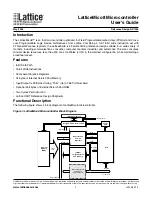
_____________________________________________________________________________________
STI S.r.l.
– Via Dei Caravaggi 15, 24040 Levate (BG) – ITALY www.imi-critical.com
Manual 5400, rev. 05 02/2018
– RTQHS
8
5.2
Reception
-
Check that the model, the serial number of the actuator and the technical data reported on the
identification plate correspond with those of order confirmation (Sect. 4).
-
Check that the actuator is equipped with the fittings as provided for by order confirmation.
-
Check that the actuator was not damaged during transportation: if necessary renovate the painting
according to the specification reported on the order confirmation.
-
If the actuator is received already assembled with the valve, its settings have already been made at the
factory.
-
If the actuator is delivered separately from the valve, it is necessary to perform the setting after the
assembling on the valve according to the following Section 7.2.
5.3
Storage
All the actuators RTQHS leave the factory in perfect condition. Performances of each unit are guaranteed by
individual test and data reported on a specific test certificate issued for each unit.
In order to maintain these characteristics until the RTQHS actuator is installed on site, proper attention must
be observed for preservation during the storage period.
If the actuator needs storage, before installation follow these steps:
-
Place it on a wood surface pallet or on metallic support, so that they are not in direct contact with the
ground
,
in order not to deteriorate the area of valve coupling, later it must be packed with appropriate
covering.
-
Make sure that plastic plugs are present on the hydraulic and electrical connections (if present).
-
Check that the limit switch box (if any) is properly closed.
-
If the storage is long-term or outdoor:
-
Keep the actuator protected from direct weather conditions.
-
Replace plastic plugs of hydraulic and electrical connections (if any) with metal plugs that guarantee
perfect tightness.
-
Coat with oil, grease or protection disc, the valve coupling area.
-
Periodically operate the actuator (Sect.6).
5.4
Requirements of Stability
-
Conditions in which the machinery meets the requirement of stability during use, transportation,
assembly, dismantling when out of service, testing or foreseeable breakdowns, are shown in Fig.2.
-
The actuator must be put, with extreme caution, in a right position on a plane surface and with adapted
capacity to the load to support.
-
Do not use actuator eye bolts lifting of valve-actuator package.
-
Concerning the requirement of stability during installation and disassembling
it ‘s possible to refer to the
next chapters 5.6 and 5.7.
5.5
Interface document and dimensional drawing
-
Hydraulic diagrams, wiring diagrams and dimensional drawing are furnished with document
accompanying the actuator.












































